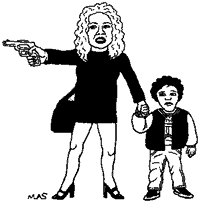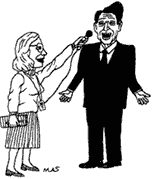
Movies
Gloria (Sony Pictures Entertainment). Pans for director Sidney Lumet's remake of a 1980 John Cassavetes film about a tough moll whose heart gets melted by a youngster who falls into her charge: "Easily qualifies as the most tired, unexciting mob movie in recent history" (Godfrey Cheshire, Daily Variety). Of Sharon Stone as the title character, played by Gena Rowlands in the original, Jack Mathews says: "It's not so much a bad performance as an unnecessary one. Anyone who has seen Cassavetes' film can imagine Lumet's and save eight bucks" (Los Angeles Times). Lawrence Van Gelder is alone in support, calling it "smoother, funnier, more suspenseful and more endearing" than the first film (New York Times). (Compare Rowlands' almost tasteful suit in the poster for the 1980 film with Sharon Stone's racy bustier in the current version.)
Playing by Heart (Miramax Films). Stephen Holden of the New York Times calls this "a likably sappy romantic comedy that suggests Robert Altman's Short Cuts dipped in chocolate." The huge, star-studded cast (Gena Rowlands, Ellen Burstyn, Jon Stewart, Sean Connery) pairs off into happy and unhappy couples. The surfeit of mildly interesting plots surrounding each duo results in a film that is "the cinematic answer to one of those parties where you pig out on canapés" (Anthony Lane, The New Yorker). The highlight of the film: a wonderful performance by Angelina Jolie (Jon Voight's daughter) as a tough club kid who falls in love with a blue-haired Ryan Phillippe. (Find out more about star Connery at CelebSite.)
Another Day in Paradise (Trimark Pictures). Melanie Griffith and James Woods play a drug-addled couple who adopt a pair of young thugs-in-training while on a road-trip-cum-crime-spree in a sort of '90s version of Bonnie and Clyde. Critics like this better than director Larry Clark's first film, the teen shocker Kids, and Woods' performance is called "scene stealing" (Richard Corliss, Time). Overall, though, reviews are so-so. On the negative side, critics say it "rolls in sleaze and squalor like a mangy dog on steaming roadkill" (Rod Dreher, the New York Post). On the positive side, Janet Maslin praises Clark for the way he manages to create "bad times with a wicked way of looking good" (the New York Times). (This fan site is packed with video stills from the film; find out more about director Larry Clark at alt.culture.)

Books
Reporting Live, by Lesley Stahl (Simon & Schuster). Mixed reviews for Stahl's account of the backroom scrapping and hard work it took for her to get taken seriously in the old boys' club of network news in the '70s and '80s. Most reviewers, such as the Washington Post's Jonathan Yardley, complain that Stahl "pulls her punches" and spends too much time on anecdotes about past presidents and too little on exactly what it took for her to get where she is. Stanley Cloud writes in the Columbia Journalism Review that the book lacks deep analysis: Stahl "never even seems to wonder if perhaps the celebrityhood, egos, careerism, and inflated salaries of on-air journalists such as herself might have contributed to the decline" of network news, which she bemoans. Robin Toner in the New York Times Book Review is less critical: "What shines through this memoir is how much Stahl loved the work." (Check out this photo of Stahl, which aptly illustrates the trouble she details in finding the right hairstyle.)
Face-Time, by Erik Tarloff (Crown). This book gets a few nice reviews--Carolyn See calls it an "excellent first novel" in the Washington Post--but most critics are interested in only in terms of the insider scoop it promises. This Primary Colors-type story of a president who has an affair with a young staffer was written by a former Clinton speechwriter. Critics praise Tarloff's rendering of political power dynamics: "What makes the novel riveting is its almost anthropological description of the ebb and flow of power and status in official Washington" (Margaret Carlson, Time). Overall, though, the dish is more appealing than the prose. (Read an excerpt here.)
Miss Nobody, by Tomek Tryzna (Doubleday). Reviewers agree that this is a "fearlessly ambitious debut novel" (Brian Hall, the New York Times Book Review), but some find that stylistically it doesn't live up to its own best intentions. The glimpse it gives into the manic highs and lows of female adolescent friendship as seen through a tortured trio of friends in the twilight of Communist Poland is remarkably vivid--full of symbolism, magic realism, and fairy-tale qualities--but most reviewers call the book as a whole a near miss. Some blame a shaky translation from the original Polish; others say the author's use of so many varying literary devices and styles squelches the heart of the novel: "Only a spark of life survives its mannerisms" (Richard Eder, the Los Angeles Times). (Read the first chapter here.)
Recent "Summary Judgment" columns
- Movie--Varsity Blues;
- Movie--At First Sight;
- Movie--In Dreams;
- Book--Duane's Depressed, by Larry McMurtry;
- Book--The Intuitionist, by Colson Whitehead;
- Theater--Fosse: A Celebration in Song and Dance (Broadhurst Theatre, New York City).
- Movie--Affliction;
- Movie--Hilary and Jackie;
- Movie--The Hi-Lo Country;
- Book--The Haunted Wood: Soviet Espionage in America--The Stalin Era, by Allen Weinstein and Alexander Vassiliev;
- Book--Note Found in a Bottle: My Life as a Drinker, by Susan Cheever;
- Book--Glamorama, by Bret Easton Ellis.
- Movie--A Civil Action;
- Movie--The Thin Red Line;
- Movie--Down in theDelta;
- Movie--Hurlyburly;
- Movie--Theory of Flight;
- Book--Careless Love: The Unmaking of Elvis Presley, by Peter Guralnick;
- Book--The Jew of New York, by Ben Katchor.
- Movie--Patch Adams;
- Movie--The Faculty;
- Movie--Stepmom;
- Movie--Mighty Joe Young;
- Book--Hundred Dollar Holiday, by Bill McKibben;
- Book--The Vintner's Luck, by Elizabeth Knox.